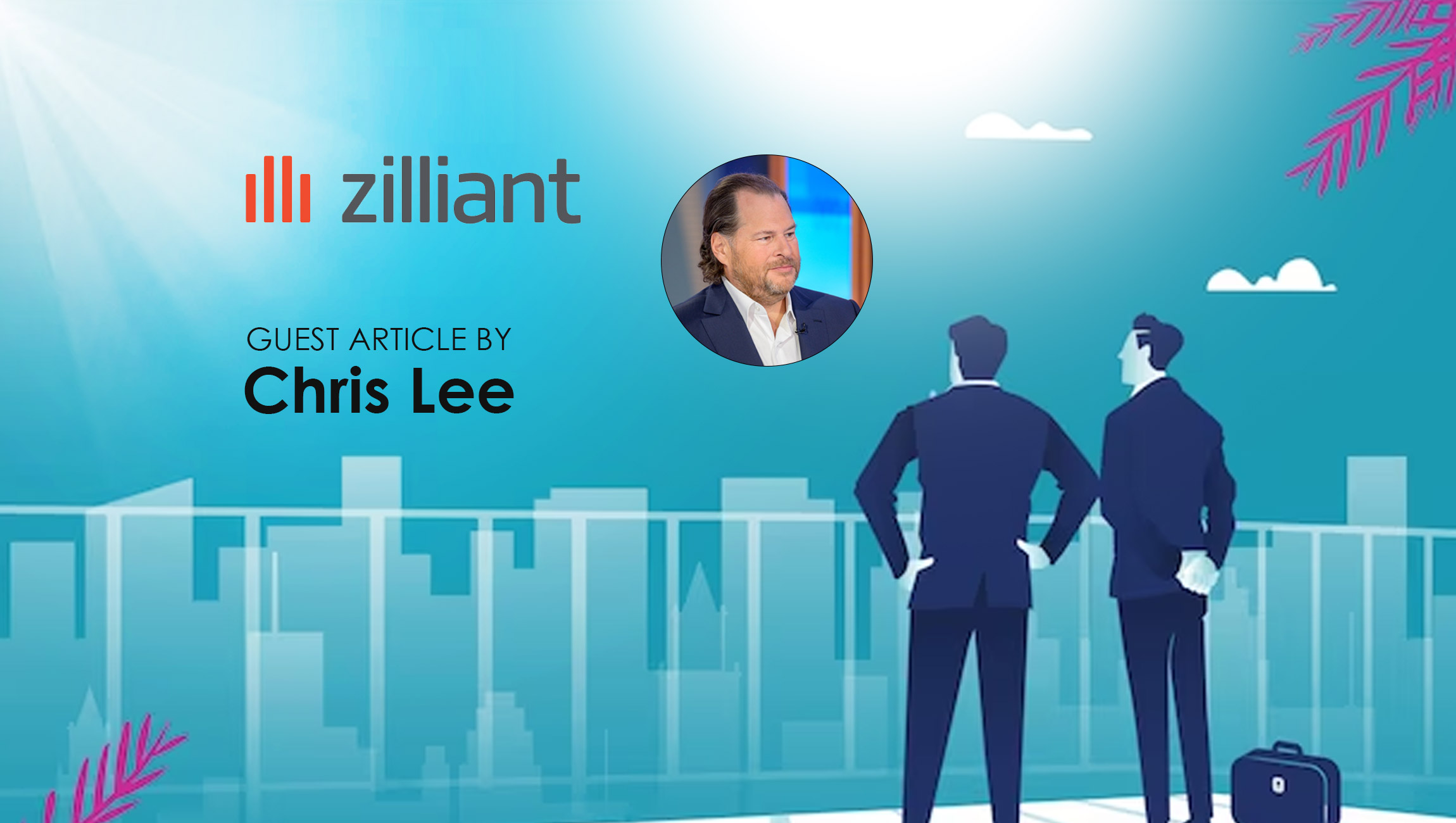What Marc Benioff Taught Me About Building a Great Company
By Chris Lee, Chief Revenue Officer, Zilliant

I started at Salesforce in 2003 and can’t remember anyone leaving the company during my first eight years there. I know that seems unbelievable—turnover at growing tech companies can be huge, and there were plenty of opportunities in Silicon Valley then. But I watched as we went public and blew past the $1 billion mark in revenue for the first time, and along the way, the same people were in the same seats.
I’ve thought a lot about how that was possible. The foundation, of course, could be found in the culture that Marc Benioff so passionately advocated for. I saw how a group of people that trust each other, help each other and have a common purpose will remove all the internal and external barriers to focus on the big goals. That infectious positive attitude also carried over to customers, who saw the team environment and knew those were the kind of people who enjoyed what they were doing and were going to be around for a while.
But can that elusive recipe for success be duplicated? I believe it can. A few key elements go into a formula that everyone can apply. I’m now fortunate to be in a position of paying it forward, particularly in my new role as Chief Revenue Officer at Zilliant, where we’ve built a team of former Salesforce executives applying the lessons we learned from Benioff to push our company to new heights. Here are the biggest takeaways from my time at Salesforce that any company leader should look to adopt.
The Easy-to-Use Platform Always Wins
A good platform will always beat a great product. The advantages of an interconnected system of multiple products are exponentially greater than a single product on its own. A platform can become the heart of any organization, with rapid adoption across the board. And once people become attached to a platform, they’re much less likely to switch. We always offered a free trial of Salesforce because we were confident that once people used it, you couldn’t pry it out of their grasp.
It’s also crucial to make it easy to do business with your company, from understanding pricing to signing a contract. No one wants to look through pages and pages of price lists and figure out which configuration they need. Simplify here—think small, medium and large—and work with customers to get them up and running quickly.
Read More: SalesTechStar Interview with Kevin Knieriem, Chief Revenue Officer at Clari
Attack Your Competition With Both Swagger and Focus
This was one of my favorite aspects of pre-IPO Salesforce. Before Salesforce Tower became a landmark on the San Francisco skyline, Salesforce was a scrappy software company battling much bigger competitors. Benioff, however, always had a swagger and never shied away from competition. The big CRM companies like Siebel Systems seemed very concerned about what we were going to do next.
There’s the well-known mock protest outside a Siebel Systems conference, complete with signs that drove Salesforce’s “The End of Software” message home. We took out a full-page ad in USA Today with a boy scribbling, “I will not give Seibel my lunch money” across a chalkboard. We paid college kids to drive trucks around the Siebel building on Wednesdays, shouting, “No Software!” The whole time, Benioff giggled at how much we were able to rattle the incumbents.
You have to back up the talk, though, with a relentless focus on your core offering. Focus on the one thing you do and do it well. Don’t try to be all things to all people. Partnerships are available to make up for what you don’t have on your own, but only you can make your platform great.
Always Offer a White-Glove Service
Sales makes the world go around. You may have a great product and can sell it, but you will have a tough time if customers can’t contact you to resolve any questions or issues. If I buy a Mercedes and find out that there’s no one working in the service department, that’s a bad experience.
We always told customers we were “in the foxhole” with them. They knew that we’d be there for them through thick and thin, which turned them into lifelong customers. That can be a tall order for B2B companies, given the trend away from in-person sales and toward digital transactions. Thankfully, technology is advancing to the point where companies can provide B2B customers with a personalized experience that is contextually relevant. Predictive sales analytics, for example, enables outside sales reps to give accounts the white-glove customer experience remotely while giving customers the personalized experience they enjoy as consumers. Whatever the sales approach, the message for growing companies is clear: Hold up your end of the bargain, and you’ll be far ahead of the competition.
Read More: Item-Level RFID: Minimizing Shrink Without Sacrificing Experience
Find Your Evangelist
One of the lasting things I remember Benioff telling customers in those early days is, “It’s not about today; it’s about tomorrow.” That kind of visionary approach puts emerging companies on the right path. A leader who is also your in-house evangelist and actively demonstrates their genuine passion for the product will also get others excited about it.
There are lessons to be learned from others’ success, and the ones that I learned at Salesforce formed the basis for the most exciting time of my career. If I can capture that excitement and share it with others, either at my own company or elsewhere, I’ll be satisfied.



